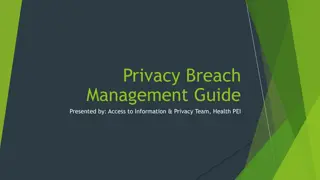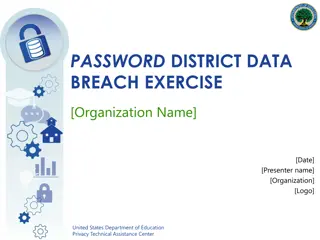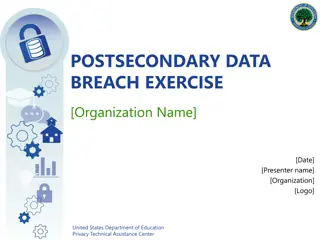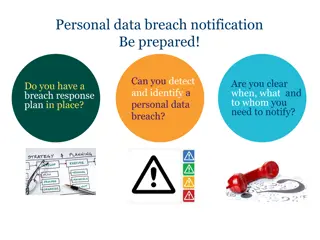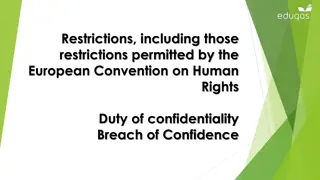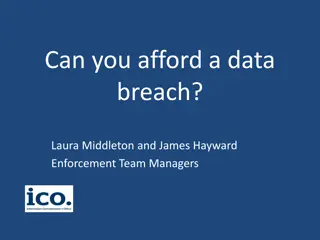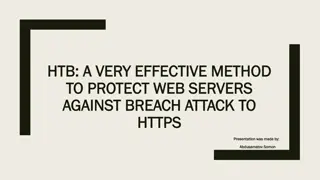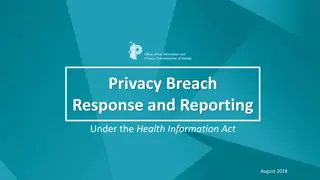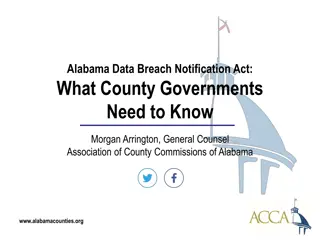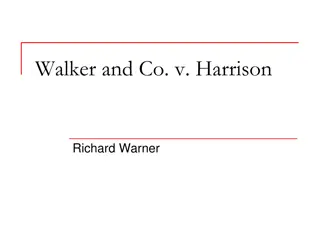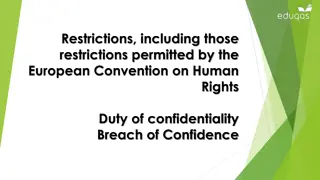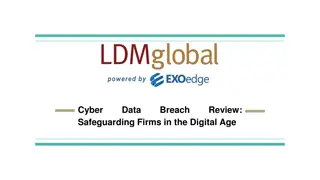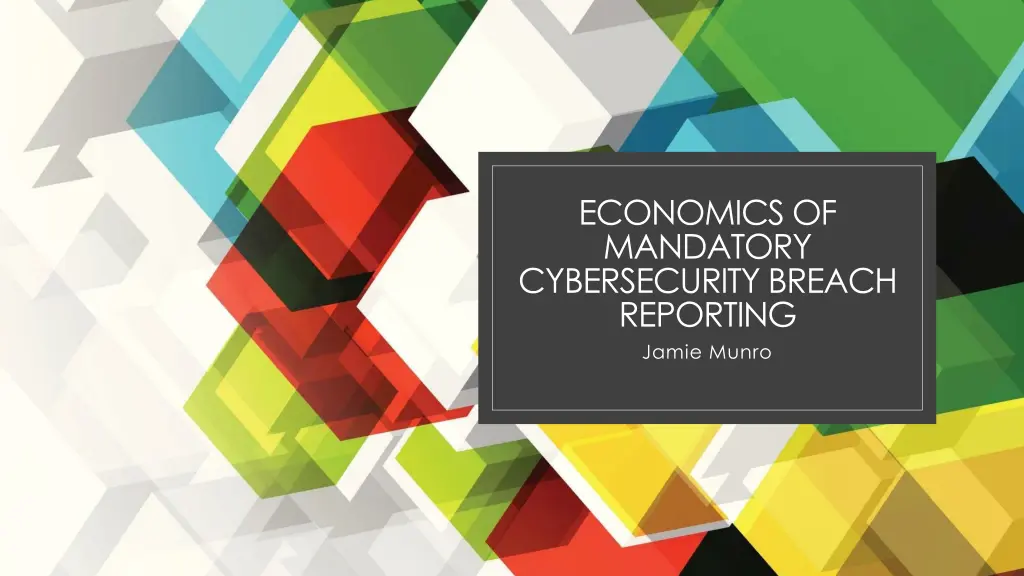
Economics of Mandatory Cybersecurity Breach Reporting
Explore the economic impacts of mandatory cybersecurity breach reporting on firms. Discover how changes in reporting can lead to higher information security and lower social costs. Learn the importance of disclosure and the benefits of mandatory reporting in enhancing cybersecurity measures.
Download Presentation

Please find below an Image/Link to download the presentation.
The content on the website is provided AS IS for your information and personal use only. It may not be sold, licensed, or shared on other websites without obtaining consent from the author. If you encounter any issues during the download, it is possible that the publisher has removed the file from their server.
You are allowed to download the files provided on this website for personal or commercial use, subject to the condition that they are used lawfully. All files are the property of their respective owners.
The content on the website is provided AS IS for your information and personal use only. It may not be sold, licensed, or shared on other websites without obtaining consent from the author.
E N D
Presentation Transcript
ECONOMICS OF MANDATORY CYBERSECURITY BREACH REPORTING Jamie Munro
Economics of Mandatory Cybersecurity Breach Reporting Stefan Laube Rainer B hme Published in 2016 Looks at the economic impacts of forcing firms to report cybersecurity breaches Research question: Mandatory security breach reporting to authorities enforced with audits and sanctions, may change the incentives of firms to invest in security and share breach information. Under what circumstances does this change lead to a higher overall level of information security, and lower social costs? https://academic.oup.com/cybersecurity/article/2/1/29/2629554
Definitions Security: Protection of the availability, integrity and confidentiality of an asset Breach: Violation of at least one of the above factors Costs associated to breaches: Direct costs cost of fixing the direct damage caused by the breach e.g. removal of malware from breached system Indirect costs intangible costs associated with breach e.g. reputation damage as a result of disclosing breach Disclosure costs: Costs specifically resulting from disclosing a security breach Form of indirect cost
Why mandate breach reporting? Firms lose an average of 2.1% of their market value in the first 2 days after a breach is reported Some (Cavusoglu et al) have argued that indirect costs usually exceed direct costs Today s IT systems are very interdependent meaning that a breach at one firm may effect many others In economics this is called a negative externality Data breaches can have a massive impact of customer s who have entrusted their data to a firm All of these factors mean: 1. Firms may have an incentive to cover up security breaches and not disclose them to regulators, investors and customers. 2. The presence of negative externalities mean that a government intervention could be justified
Benefits of mandatory breach reporting Increase the risks to firms covering up security breaches Force firms to be more transparent Incentivise firms to invest in cybersecurity Leverage the collective knowledge of the regulator: Regulator can use the reported breaches to gain insights Regulator can issue security advice to firms More efficient security investments can be made Over time, collective knowledge can drive down security costs
Mandatory breach reporting laws Mandatory breach reporting laws aim to increase costs for firms that have experienced security breaches: Disclosure (indirect) costs for firms that comply Possible sanctions for firms that don t comply Firms can reduce the costs associated with mandatory breach reporting laws by avoiding a breach in the firm place: Improved security Increased security investment Mandatory breach reporting laws can be divided into two broad categories: 1. Oblige firms to report breaches to affected individuals 2. Oblige firms to report breaches to authorities Both forms have already been tried out: Some states in the US require firms to report breaches to affected individuals GDPR in EU mandates reporting breaches (in some sectors) to authorities
Compliance How can firms be incentivised to comply with breach reporting regulation? Sanctions for firms who don t comply How can you tell if a firm is complying? Random security audits for firms that haven t reported a breach Regulator must carefully select: Probability of a firm being selected for an audit Severity of any sanctions
Mathematical Modelling The authors propose a mathematic model to analyse the impact of adjusting the sanction severity and audit probability The model was a principal-agent model: Principal is the regulator/authority Agents are the firms The model has three key components: 1. Model for security investment and security interdependence between firms 2. Formalization of mandatory security breach reporting to authorities 3. Formalization of security audits A game theoretic approach is taken to analysing the social optima of breach reporting: Under what conditions are the greatest benefits to society derived?
Findings from the model When a firm experiences a security breach, they have two options: Report breach to regulator and suffer any disclosure costs Cover up breach to avoid disclosure costs Firms that choose to cover up the breach can experience one of two outcomes: Successfully cover up breach and avoid disclosure costs Security audit discovers breach and firm now faces disclosure costs and sanctions Firms are likely to comply when the disclosure costs are less then sanctions Firms are likely to try to cover up the breach when the expected disclosure costs are higher then sanctions
Findings from the model (continued) Regulators can increase the share of firms that comply by increasing sanction severity However if the sanctions are set too high: Sanction may drive firm bankrupt and is therefore uncollectible Firms may over invest in security which could lower productivity Intrusion detection is not 100% reliable and so honest (but unsecure) firms may be penalised Firms can benefit from the collective knowledge gathered by the regulator
Conclusions from the model If disclosure costs are high and the regulator does not impose audits, firms are not incentivised to report breaches and less benefit can be derived from collective knowledge If security audit and sanctions are imposed, firms can be incentivised to report breaches through careful selection of the sanction severity and audit probability Mandatory reporting laws are most effective when disclosure costs are low Mandatory reporting laws are unlikely to be effective if disclosure costs significantly exceed direct costs
Critique Model was not able to quantify all direct and indirect costs Cost of carrying out security audits may outweigh the societal benefits: This is not considered by the model Societal benefits assume that the regulator is able to derive useful insights from reports: This is not quantified by the model Over reporting can damage the quality of data Over investment in security may be unproductive Random security audits are exploitable: Paper suggests that only firms who do not report a breach would be audited strategic disclosure Firms could use political connections to avoid audits Firms could use techniques to deceive an audit
Praise Collective knowledge can be utilised in a variety of ways: Reduce security interdependence Make more efficient security investments possibly driving down costs Reduce the probability of similar breaches occurring in future Firms are incentivised to invest and develop better security systems Breach reports could be used as security datasets and case studies for research and educational purposes Customers have the right to know when their data has been breached: Paper focuses on economic benefits and does not discuss moral benefits
Critical Systems Security is often an essential component of critical systems Critical systems can benefit from information provided by the mandatory reports from other systems Critical systems can benefit from the collective knowledge of the regulator Security breach reporting is appropriate for many critical systems

